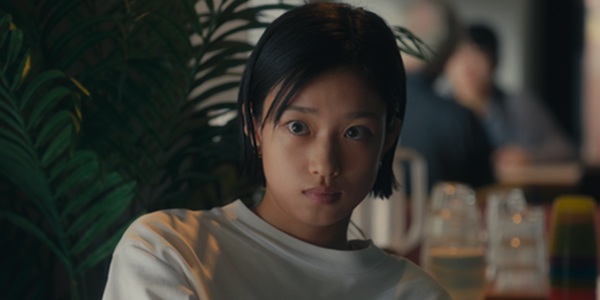Every generation has some angst-ridden cinema that informs the world how hard it is to be that generation. The time and place change, but the overall message remains the same: coming of age is hard, especially in a world that appears to care nothing about you or your future, so why should you bother trying? And while this is not a phenomenon unique to Gen Z, they are the current generation living through it, so it is their turn to make movies about it.
Desert of Namibia is one of those movies. The sophomore feature from writer-director Yoko Yamanaka (Amiko) chronicles the misadventures of a 21-year-old hair removal technician at a beauty salon in Tokyo as she floats between troubled relationships and engages in acts of angry self-sabotage; she is seemingly only capable of finding peace by watching a live-stream of a desert watering hole on her phone. Yet as Desert of Namibia progresses, and our (anti-)heroine’s behavior grows more erratic and destructive, it’s hard to maintain interest in and empathy for her, even with an incredibly talented actress embodying the character.
The Real Worst Person in the World
Kana (Yuumi Kawai) is having a hard time getting by. When she grabs coffee with an old friend and is told that a former classmate committed suicide, she can barely summon the energy to react, instead allowing herself to be distracted by sexist gossip from the men at a nearby table. She lives in a little flat with a boyfriend who is devoted to the point of suffocation, which clashes with her more freewheeling approach to life and love; when she staggers home drunk after hooking up with another guy—even carrying the flowers that guy gave her—he still holds her hair back while she throws up. At work, she merely goes through the motions, robotic and disinterested; she cannot bring herself to care about women’s obsession with removing their hair to meet beauty standards set by men, even if it is how she makes something approximating a living. (Besides, as she points out, it will all grow back anyway.)

Watching her, it’s clear that Kana feels like an outcast who cannot relate to anyone around her, even other members of her generation. As someone of Chinese extraction living in Japan, she is automatically labeled an outsider. She has no ambition or plans for the future beyond where she plans on going out to drink that night; the only time she shows energy and excitement is when she giddily romps through the streets right before or after a drunken hook-up. Undeniably beautiful, Kana seems to view her desirability by men as her only redeeming quality—and indeed, if she were not beautiful, there is no way the two boyfriends she bounces between would keep putting up with her behavior, which includes ongoing emotional and physical abuse.
Post-Millennium Mambo
Desert of Namibia clocks in at two hours and seventeen minutes, yet it isn’t until approximately the 90-minute mark that the film implies that Kana’s behavior could be the result of undiagnosed mental illness. The problem is, by the time this happens, it’s very hard for the audience to summon any residual sympathy for her; if anything, you feel angry, as though you are being emotionally manipulated not only by Kana but by the film itself. Feeling depressed and numb due to your lack of hope for the future isn’t anything new, nor is using sex and booze to feel something, anything, that might make life feel worthwhile. Feeling suffocated by societal expectations is something that plagues nearly all of us at some point in life. But none of this—no amount of spiritual emptiness, not even mental illness—is an excuse for being an asshole to everyone around you. Watching Kana behave this way for over two hours is downright exhausting; perhaps if you are still young and in the throes of such existential crises yourself, it is easier to put up with, but I’ve aged out of finding such stuff interesting.
That being said, Kumai is a charismatic actress who deserves praise for her raw, unflinching performance. Desert of Namibia is just as much a showcase for her considerable talents as The Worst Person in the World was for Renate Reinsve; as much as you might want to, you cannot tear your eyes away from her when she is on screen. The film is well crafted, shot in long, meandering takes that emphasize the aimless mindset of the protagonist, while the grating, discordant soundtrack provided by composer Takuma Watanabe echoes Kana’s bristling anger at the idea of conformity, which she sees as a form of dishonesty. In one of the film’s most compelling scenes, Kana listens to a therapist tell her that it’s fine to think whatever you want, but you shouldn’t always say whatever you want—no one does. But it’s scary to live in a world where so many people are saying things they don’t mean, Kana points out, and in that moment, it’s hard to argue with her. It’s a shame that such moments are few and far between in Desert of Namibia, and mostly come in the film’s final act when you’re running out of energy to keep watching.
Conclusion
Aesthetically pleasing but ultimately frustrating, Desert of Namibia fails to resonate despite Kawai’s substantial star power.
Desert of Namibia opens at Metrograph in New York on May 16, 2025 before expanding to other markets.
Does content like this matter to you?
Become a Member and support film journalism. Unlock access to all of Film Inquiry`s great articles. Join a community of like-minded readers who are passionate about cinema - get access to our private members Network, give back to independent filmmakers, and more.